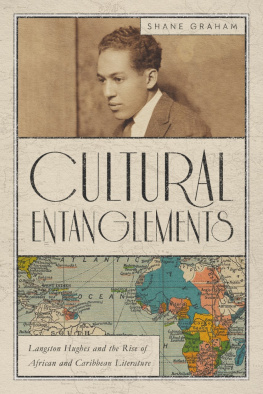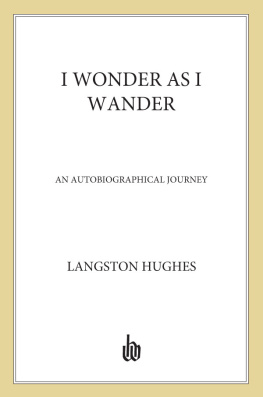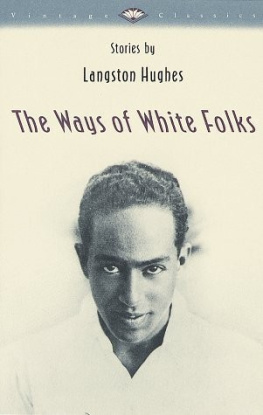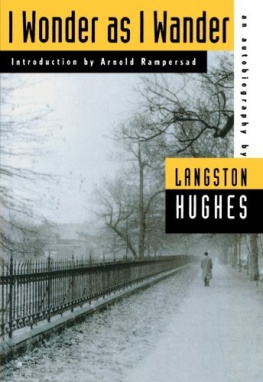Bonnie Greer - Langston Hughes: The Value of Contradiction
Here you can read online Bonnie Greer - Langston Hughes: The Value of Contradiction full text of the book (entire story) in english for free. Download pdf and epub, get meaning, cover and reviews about this ebook. year: 2011, publisher: Arcadia Books Limited, genre: Politics. Description of the work, (preface) as well as reviews are available. Best literature library LitArk.com created for fans of good reading and offers a wide selection of genres:
Romance novel
Science fiction
Adventure
Detective
Science
History
Home and family
Prose
Art
Politics
Computer
Non-fiction
Religion
Business
Children
Humor
Choose a favorite category and find really read worthwhile books. Enjoy immersion in the world of imagination, feel the emotions of the characters or learn something new for yourself, make an fascinating discovery.
- Book:Langston Hughes: The Value of Contradiction
- Author:
- Publisher:Arcadia Books Limited
- Genre:
- Year:2011
- Rating:4 / 5
- Favourites:Add to favourites
- Your mark:
- 80
- 1
- 2
- 3
- 4
- 5
Langston Hughes: The Value of Contradiction: summary, description and annotation
We offer to read an annotation, description, summary or preface (depends on what the author of the book "Langston Hughes: The Value of Contradiction" wrote himself). If you haven't found the necessary information about the book — write in the comments, we will try to find it.
Langston Hughes: The Value of Contradiction — read online for free the complete book (whole text) full work
Below is the text of the book, divided by pages. System saving the place of the last page read, allows you to conveniently read the book "Langston Hughes: The Value of Contradiction" online for free, without having to search again every time where you left off. Put a bookmark, and you can go to the page where you finished reading at any time.
Font size:
Interval:
Bookmark:
For my brother the poet/educator Ben Greer III and our great-nephew, Cameron Jay Greer
/
/
/
/
/
/
/
/
/
/
/
/
/
/
LangstonHughesTellsSenatorsHesAgainstCommunists.
AFRICAN AMERICAN READERS opening their 9 April 1953 edition of the black tabloid magazine Jet would have been surprised to see this caption anywhere near a photo of the man widely considered to be the poet laureate of African America. Langston Hughes was considered the champion of his people, an inspiration for people of African descent all over the world, for all oppressed peoples, no matter what colour they were.
He had written hundreds of poems, numerous novels, works for children, dozens of short stories, plays, essays, operas, screenplays, autobiographies, had taught at numerous universities. His matrix was the African American experience, with all of its beauty and passion, humour, fearlessness and, above all, truth. In photos of Langston at the Senate hearing , he looks almost apologetic, accommodating, as if he is trying to bring his hostile interrogators over to his side.
His immortal creation, a black Everyman, a man who spoke in the voice of ordinary black people Jesse B. Semple known as Simple would have mocked Langston mercilessly. Hypocrite would have been the least of Simples terms to describe Langston, sitting at the table of his enemies, appearing as a friendly witness before Joseph McCarthys notorious Senate Permanent Subcommittee on Investigations. Simple would have said that Langston Hughes was trying to be nice to a group of politicians not worthy to tie his shoelaces.
Unfortunately, what the readers of Jet would have seen was this: one of the role models of the black community had sold out. Bowed down. Gave them everything they wanted. Langston Hughes had become a witness.
There were two types of witness: hostile those who appeared but who did not speak, invoking the Fifth Amendment of the US Constitution which gives citizens the right not to incriminate themselves; or those who answered questions but not with the answers the Committee wanted. And then there were the friendly witnesses who cooperated.
Langston cooperated.
Everyone in America knew that the Committee existed to expose what it considered to be enemies of America. Those enemies were usually on the Left. Appearing as a friendly witness was not only about giving individual personal testimony, it could open a floodgate that could destroy friends and associates as well. Langston knew this. Because of who he was and what his life and work had stood for, Langston would have been expected by one and all to be a hostile witness . He didnt even have to show up.
Charlie Chaplin hadnt.
Charlie had been the biggest movie star on the planet when Langston was a child, a huge cultural force. Charlie had refused to appear when subpoenaed , and instead had taken his young American family first to his native London, and finally to Switzerland. He returned briefly about twenty years later to accept a special Oscar and then left again.
Or, if Langston had decided to appear, he could have refused to answer questions, like the black professor Doxey A. Wilkerson had done earlier on the very same day that Langston had appeared. Being a great poet, Langston could have said something elegant when questioned, like the screenwriter John Howard Lawson had done a few years before:
Questioner: Are you now or have you ever been a member of the Communist Party of the United States?
Lawson: Its unfortunate and tragic that I have to teach this committee the basic principles of Americanism I shall continue to fight for the Bill of Rights, which you are trying to destroy.
By being before the Senate, it seemed to many that Langston was repudiating everything he had once stood for, turning his back on it all on that spring day on Capitol Hill, Washington DC. Langston was quoted in Jet as saying to the Committee that he was amazed to learn that his old pro-Communist writings were in State Department libraries abroad. This was the reason the Committee had given for summoning him
But Langston assured them that since race relations had improved in the US, America was a better place than the Soviet Union. The average black person would have been shocked by this reply. Unfortunately many young black people, particularly artists, would not have been shocked. This generation, veterans of World War II, were vocal and standing up for their rights, in housing and jobs, in the courts and in the streets. To them Langston was old-fashioned. To others, by going to the Senate, he was a traitor to the Cause.
And they cast him out of their minds and their hearts.
Decades after his appearance before that Senate Subcommittee, Langston Hughes has been elevated to that pantheon of African American and African Caribbean writers who make up the golden age of the Harlem Renaissance. He is now considered one of the Renaissances leading lights, a visionary, an African American man determined to have a literary career, and to have it in America.
Langston Hughes was a handsome, cultured man of small stature, a man who took Walt Whitman, the nineteenth-century poet who had changed American poetry forever, as one of his role models. But it was to black working-class people that Langston looked for inspiration. It was they whom he celebrated.
Langston has been called the Father of Black Consciousness , the leading African American writer of the last century. There are many interpretations of his life, aspects of which are still being discovered because his output was prodigious and varied. Some of it is still coming to light. This is what is known:
Between the ages of twenty-seven and twenty-eight , Langston published his first novel NotWithoutLaughter which won the prestigious 1931 Harmon Gold Medal for Literature. His first collection of short stories was published four years later. Both of these works were literary breakthroughs in the creation of the style known as social realism. In 1935, when he was in his early thirties, Langston received a Guggenheim Fellowship; in 1938, he established the Harlem Suitcase Theater in New York City; a year later, the New Negro Theater in Los Angeles; and two years after that, the Skyloft Players in Chicago. He was energetic and prolific.
But racism, its relentless grind, was always present. He found it everywhere.
The year that Langston opened the New Negro Theater in Los Angeles, he wrote a screenplay. By then he was a successful Broadway playwright who wanted to try his hand at the movies. But Hollywood had no place for a black screenwriter and only the most restricted of places for black on-screen talent. For example, when Hattie McDaniel won her Oscar for Best Supporting Actress for GoneWithTheWind, she had to enter through the kitchen entrance of the restaurant where the award ceremony was being held. Black people could not enter through the front door.
The immortal Queen of Jazz, the vocalist Ella Fitzgerald, was originally considered for the part of Sam, Humphrey Bogarts sidekick in the classic film Casablanca. But it would have been impossible to cast a black woman in a role opposite a white male leading actor which could have implied a relationship with romantic and/or sexual overtones. Any movie theatre showing a film like that would have been in serious danger. So Sam became an African American man, rather than an African American woman.
During World War II the African American singer and actress Lena Horne, a universally acknowledged beauty, was signed by the mega-studio MGM in part to placate the black troops fighting abroad who had no glamour girl of their own in the movies. But Lenas magnificent beauty and voice were too often showcased in a solitary environment within the film. This made it easier to cut her part for the segregated movies houses in the Deep South.
Font size:
Interval:
Bookmark:
Similar books «Langston Hughes: The Value of Contradiction»
Look at similar books to Langston Hughes: The Value of Contradiction. We have selected literature similar in name and meaning in the hope of providing readers with more options to find new, interesting, not yet read works.
Discussion, reviews of the book Langston Hughes: The Value of Contradiction and just readers' own opinions. Leave your comments, write what you think about the work, its meaning or the main characters. Specify what exactly you liked and what you didn't like, and why you think so.







